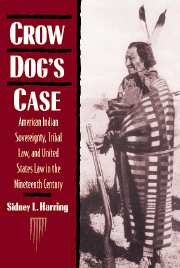 Crow Dog's Case
Crow Dog's Case Book contents
- Frontmatter
- Contents
- Acknowledgments
- 1 “This high pretension of savage sovereignty”
- 2 Corn Tassel: state and federal conflict over tribal sovereignty
- 3 U.S. Indian law and the Indian nations: the Creek Nation, 1870–1900
- 4 Crow Dog's case
- 5 Imposed law and forced assimilation: the legal impact of the Major Crimes Act and the Kagama decision
- 6 Sitting Bull and Clapox: the application of BIA law to Indians outside of the Major Crimes Act
- 7 The struggle for tribal sovereignty in Alaska, 1867–1900
- 8 The legal structuring of violence: U.S. law and the Indian wars
- 9 Conclusion
- Index
4 - Crow Dog's case
Published online by Cambridge University Press: 23 September 2009
- Frontmatter
- Contents
- Acknowledgments
- 1 “This high pretension of savage sovereignty”
- 2 Corn Tassel: state and federal conflict over tribal sovereignty
- 3 U.S. Indian law and the Indian nations: the Creek Nation, 1870–1900
- 4 Crow Dog's case
- 5 Imposed law and forced assimilation: the legal impact of the Major Crimes Act and the Kagama decision
- 6 Sitting Bull and Clapox: the application of BIA law to Indians outside of the Major Crimes Act
- 7 The struggle for tribal sovereignty in Alaska, 1867–1900
- 8 The legal structuring of violence: U.S. law and the Indian wars
- 9 Conclusion
- Index
Summary
Although the Supreme Court's holding in Crow Dog was a striking recognition of the Brule's retention of tribal law as an element of tribal sovereignty, whites deliberately misrepresented the case as a simple one of factional politics and murder, thereby demeaning all elements of the Brule Sioux society and culture, including their law. Accompanying a parallel attempt to discredit the tribal laws of the Indian nations in Oklahoma, the BIA successfully created a brutal image of the tribal law of reservation Indians. While the Indian nations had gone to great lengths to establish the legitimacy of their legal orders in relation to the American nation, the same was not true for the tribes in the West, who remained independent and carried on traditional ways in their ancestral lands. Crow Dog's Brule people were among these so-called wild tribes.
In ex parte Crow Dog, the U.S. Supreme Court reversed Crow Dog's conviction for the 1881 shooting death of his chief, Spotted Tail. The court did not address the substantive grounds of the case but held that, following Worcester, Indian tribes retained the right to their own tribal law as an inherent attribute of sovereignty; therefore, the courts of the United States lacked criminal jurisdiction over crimes committed between Indians in Indian country. By all accounts, this decision aroused such a popular outcry that Congress was compelled to enact the Major Crimes Act of 1885 extending federal jurisdiction to major felonies occurring between Indians in Indian country. The case never comes to mind without at least an unconscious thought that the holding allowed a killer to escape punishment, perpetrating an injustice that a popular reaction caused Congress to remedy through the imposition of federal law.
- Type
- Chapter
- Information
- Crow Dog's CaseAmerican Indian Sovereignty, Tribal Law, and United States Law in the Nineteenth Century, pp. 100 - 141Publisher: Cambridge University PressPrint publication year: 1994


